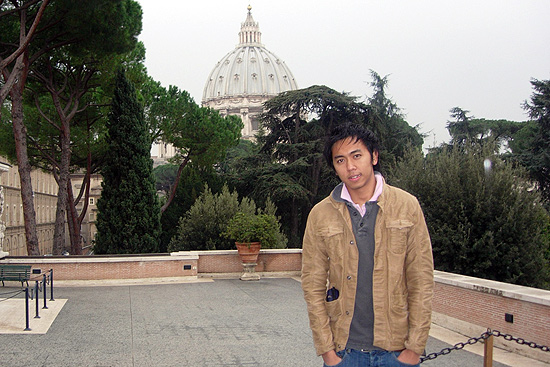Economists Award Junior for Economics Research
 |
| Iwan Djanali is the recipient of a Hartford Area Business Economists scholarship. |
| Posted 05/01/08 |
| Iwan Djanali ’09 says by studying economics, he’s not only gained a firm understanding of the market, but also an understanding of peoples behavior.
“Some of the best conversations I have had with professors and fellow economics students and friend, revolve around the world of economics; from crime to credit crunch, from pollution to public policy, from mini markets to money markets, I am always ready to offer my opinions as an economics student just about everything in life,” says Djanali, who is majoring in economics and mathematics. As a recent recipient of a Hartford Area Business Economists (HABE) scholarship, Djanali will continue studying economics in 200809 at Wesleyan. After graduation, he plans to work at an investment bank before pursuing a Ph.D in finance or business economics. Hartford Area Business Economists scholarships are available to students enrolled in a Connecticut institution of higher education private or public majoring in economics or a related field. Djanali was awarded the scholarship for his academic achievement, letter of recommendation, and application essay, which emphasized potential contributions to the fields of business and economics. He received $500 and an honorary membership to the society. Assistant Professor of Economics Abigail Hornstein wrote Djanalis letter of recommendation. Djanali was a student in her quantitative methods, corporate finance and econometrics courses and worked as a course assistant in her quantitative methods and corporate finance classes. Iwan is a consistently strong student whom I have seen do very well with different types of economic material, Hornstein says. He has a strong interest in corporate finance and is now writing his second research paper for me on different financial topics. His first paper was published in the April 2008 edition of the psychology journal, Mind Matters. The paper was on experimental economics, which is a relatively young field that combines economics and psychology, says Djanali. The experiment conducted for the paper had a similar methodology as most psychology experiments, but the topic and certainly the analysis of the data were mostly based on economic theories. His article, titled “Awareness of deductions and their reallocations,” arose from a personal desire to question or debunk previouslyaccepted results and theories. Using a uniquely designed experiment, Djanali was able to question the legitimacy of two popular papers in experimental economics and bring their results closer to the reality of current tax systems, where the element of awareness of deductions is introduced. Djanalis courses on methods in economics, microeconomics analysis, investment finance, corporate finance, managerial control, experimental economic, econometrics prepared him for international internship opportunities. Last summer, he worked at Bear Stearns in New York and was appointed leader of a research team to create one of the worlds first activelymanaged ExchangeTraded Funds (ETFs). Despite my initial lack of knowledge about ETFs, I felt confident in applying the analytical skills I gained in my economics classes to understand thoroughly this noteworthy asset class, he says. While the product is currently still under development, I am glad that I have made my contribution, however small, to the financial markets by providing more financial tools for investors with varying riskreturn and liquidity preferences. During the Fall 2007 semester, Djanali interned at a small consulting firm in Paris, France, where he conducted research on companies, industries, and the general market, and prepared pitch materials in both English and French. This summer, Djanali will intern at Lehman Brothers in Hong Kong. The study of economics has indeed made me grow as a person, he says. I have truly enjoyed the benefits of being a student of economics. I have become much more aware and had a better understanding of my surrounding. |
| By Olivia Drake, The Wesleyan Connection editor |

